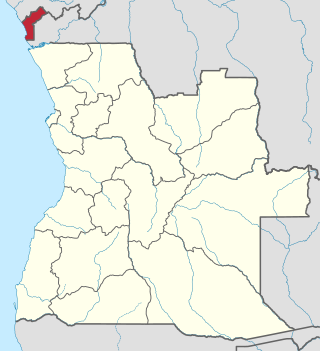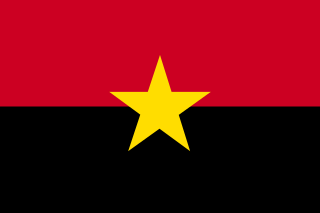Related Research Articles

Angola, officially the Republic of Angola, is a country on the west-central coast of Southern Africa. It is the second-largest Lusophone (Portuguese-speaking) country in both total area and population and is the seventh-largest country in Africa. It is bordered by Namibia to the south, the Democratic Republic of the Congo to the north, Zambia to the east, and the Atlantic Ocean to the west. Angola has an exclave province, the province of Cabinda, that borders the Republic of the Congo and the Democratic Republic of the Congo. The capital and most populous city is Luanda.

Luanda is the capital and largest city of Angola. It is Angola's primary port, and its major industrial, cultural and urban centre. Located on Angola's northern Atlantic coast, Luanda is Angola's administrative centre, its chief seaport, and also the capital of the Luanda Province. Luanda and its metropolitan area is the most populous Portuguese-speaking capital city in the world and the most populous Lusophone city outside Brazil. In 2020 the population reached more than 8.3 million inhabitants.

Portuguese Mozambique or Portuguese East Africa were the common terms by which Mozambique was designated during the period in which it was a Portuguese colony. Portuguese Mozambique originally constituted a string of Portuguese possessions along the south-east African coast, and later became a unified colony, which now forms the Republic of Mozambique.

Cabinda is an exclave and province of Angola, a status that has been disputed by several political organizations in the territory. The capital city is also called Cabinda, known locally as Tchiowa, Tsiowa or Kiowa. The province is divided into four municipalities—Belize, Buco-Zau, Cabinda and Cacongo.

The People's Movement for the Liberation of Angola, from 1977–1990 called the People's Movement for the Liberation of Angola – Labour Party, is an Angolan social democratic political party. The MPLA fought against the Portuguese Army in the Angolan War of Independence from 1961 to 1974, and defeated the National Union for the Total Independence of Angola (UNITA) and the National Liberation Front of Angola (FNLA) in the Angolan Civil War. The party has ruled Angola since the country's independence from Portugal in 1975, being the de facto government throughout the civil war and continuing to rule afterwards.

Cuanza Sul Province is a province of Angola. It has an area of 55,660 square kilometres (21,490 sq mi) and a population of 1,881,873. Sumbe is the capital of the province. Dom Francisco Inocêncio de Sousa Coutinho founded the province in 1769 as Novo Redondo.

The Angolan War of Independence, known as the Armed Struggle of National Liberation in Angola, was a war of independence fought between the Angolan nationalist forces of the MPLA, UNITA and FNLA, and Portugal. It began as an uprising by Angolans against the Portuguese imposition of forced cultivation of only cotton as a commodity crop. As the resistance spread against colonial authorities, multiple factions developed that struggled for control of Portugal's overseas province of Angola. There were three nationalist movements and also a separatist movement.

The Angolan Civil War was a civil war in Angola, beginning in 1975 and continuing, with interludes, until 2002. The war began immediately after Angola became independent from Portugal in November 1975. It was a power struggle between two former anti-colonial guerrilla movements, the communist People's Movement for the Liberation of Angola (MPLA) and the anti-communist National Union for the Total Independence of Angola (UNITA).

The Portuguese Colonial War, also known in Portugal as the Overseas War or in the former colonies as the War of Liberation, and also known as the Angolan, Guinea-Bissau and Mozambican War of Independence, was a 13-year-long conflict fought between Portugal's military and the emerging nationalist movements in Portugal's African colonies between 1961 and 1974. The Portuguese regime at the time, the Estado Novo, was overthrown by a military coup in 1974, and the change in government brought the conflict to an end. The war was a decisive ideological struggle in Lusophone Africa, surrounding nations, and mainland Portugal.

The Ongoing Revolutionary Process was the period during the Portuguese transition to democracy starting after a failed right-wing coup d'état on 11 March 1975, and ended after a failed left-wing coup d'état on 25 November 1975. This far-left politics, labor movement-inspired period was marked by political turmoil, right-wing and left-wing violence, instability, the nationalization of companies, forcible occupation and expropriation of private lands as well as talent and capital flight.

The Republic of Cabinda was an independent protectorate of Portugal that was taken over by Angola after Portugal declared Angola a free country. It is currently an unrecognized state, which Angola considers its Cabinda Province property. The Front for the Liberation of the State of Cabinda-Exército de Cabinda (FLEC) claimed sovereignty just after the Republic of Cabinda was proclaimed as an independent country in 1975 from Portugal and just after Angola invaded. The government of this entity operates in exile, with offices located in Paris, France, and Pointe Noire, Republic of the Congo.

The People's Republic of Angola was the self-declared socialist state which governed Angola from its independence in 1975 until 25 August 1992, during the Angolan Civil War.

Slavery in Angola existed since the late 15th century when Portugal established contacts with the peoples living in what is the Northwest of the present country, and founded several trade posts on the coast. A number of those peoples, like the Imbangala and the Mbundu, were active slave traders for centuries. In the late 16th century, Kingdom of Portugal's explorers founded the fortified settlement of Luanda, and later on minor trade posts and forts on the Cuanza River as well as on the Atlantic coast southwards until Benguela. The main component of their trading activities consisted in a heavy involvement in the Atlantic slave trade. Slave trafficking was abolished in 1836 by the Portuguese authorities.

Relations between Angola and Nigeria, primarily based on their roles as oil exporting nations, are cooperative and sturdy. Both are members of the Organization of the Petroleum Exporting Countries, the African Union, and other multilateral organizations.

Russia–Zambia relations are the bilateral relations between Russia and Zambia.

In southwestern Africa, Portuguese Angola was a historical colony of the Portuguese Empire (1575–1951), the overseas province Portuguese West Africa of Estado Novo Portugal (1951–1972), and the State of Angola of the Portuguese Empire (1972–1975). It became the independent People's Republic of Angola in 1975.

The Cabinda War is an ongoing separatist insurgency, waged by the Front for the Liberation of the Enclave of Cabinda (FLEC) against the government of Angola. FLEC aims at the restoration of the self-proclaimed Republic of Cabinda, located within the borders of the Cabinda province of Angola.
Confederação Geral dos Trabalhadores de Angola was a Catholic Angolan trade union organization in exile. CGTA was founded in 1962. CGTA advocated in favour of 'trade union pluralism', and was independent of political parties.
Confederação Nacional dos Trabalhadores de Angola was an Angolan trade union organization. CNTA was founded by Mauricio Luvualu in Luanda in 1974. Luvualu had been a leader of the União Geral dos Trabalhadores de Angola, but was handed over by the Kinshasa government to the Portuguese in 1971 and sentenced to forced labour. Upon his release in 1974, he received a financial compensation, and with these funds he set up CNTA. For a brief period until MPLA monopolized trade union activities under UNTA, CNTA was the main labour organization inside the country. CNTA organized a series of strikes demanding higher salaries and improved terms of employment. The organization protested against the proposal to install a single trade union centre in the country, charging it as being a plot hatched by the Portuguese government.
Civil society is often loosely defined as independent organizations that form out of mutual interest and can act to influence the state. The degree of autonomy that civil society groups enjoy from the state reveals the extent to which the public sphere can act on its own to impact government policy, and as such is a helpful metric of democratization within a state. In Lusophone African countries, democratization varies considerably across borders; in 2021, of all the member states of the African States of Portuguese Official Language (PALOP), only São Tomé and Príncipe and Cape Verde were ranked "Free" on the Global Freedom Score by Freedom House, while Guinea-Bissau and Mozambique were classified as "Partly Free" and Angola and Equatorial Guinea as "Not Free". Though variations exist, conditions for civil society organizations in these states are often influenced by a common violent past, as independence from Portugal often came as a result of liberation wars followed by civil conflict.
References
- ↑ "Article 33" (PDF). The Constitution of Angola. Retrieved 2007-05-18.
- 1 2 ICTUR; et al., eds. (2005). Trade Unions of the World (6th ed.). London, UK: John Harper Publishing. ISBN 0-9543811-5-7.